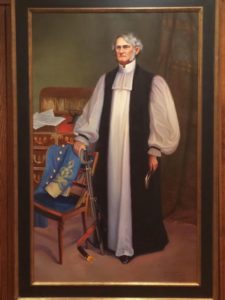What the Diocese of Louisiana has to say about Leonidas Polk, its first bishop and a Confederate general:
In 1838, the General Convention elected Leonidas Polk as Missionary Bishop of Arkansas. His enormous territory encompassed Alabama, Arkansas, Mississippi, Louisiana, and the Republic of Texas — 500,000 square miles and 1,500,000 people. His indefatigable missionary travels endeared him to Louisiana, which organized as a diocese in 1839, and asked the General Convention to name him as Bishop of Louisiana in 1841. His long and fruitful episcopate ended with fame and some notoriety when he became a major general in the Confederate forces and was killed by a cannon ball in Pine Mountain, Georgia.
Their history continues,
By 1866, the Diocese of Louisiana — which had never formally joined the Confederate Church — had returned to the Episcopal Church and faced a dismaying loss of young men, the bitterness of defeat, destroyed churches, Reconstruction, chronic poverty, changing demographics, outbreaks of yellow fever, floods, storms, ethnic and racial unrest, and potentially divisive changes in the Church.
In its history, the Diocese of Georgia is more forthcoming about the role its bishop, and Polk, played in the creation of The Protestant Episcopal Church in the Confederate States of America:
In 1861, Bishop Elliott and Leonidas Polk, Bishop of Louisiana issued a letter calling for a break with the General Convention of The Episcopal Church, which they noted came not from doctrinal differences but “political changes.” The group that met in response to this letter formed the Protestant Episcopal Church of the Confederate States of America, with Bishop Elliott as its first and only Presiding Bishop. The Confederate church was reunited with the remainder of The Protestant Episcopal Church in the United States in 1865.
